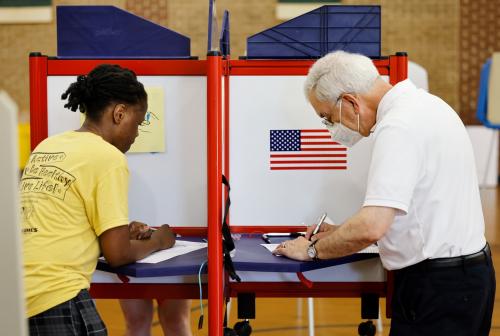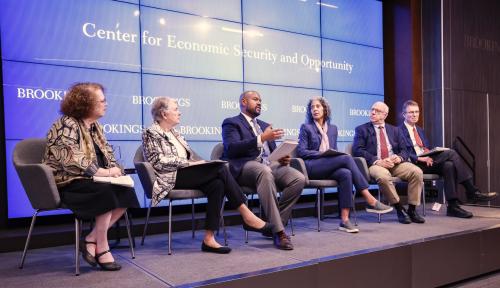Thomas E. Mann, the W. Averell Harriman Chair and Senior Fellow in Governance Studies at the Brookings Institution, answered questions on the issues and party politics that are shaping election season in the United States. Following is the transcript:
On November 7, 2006, Americans will elect representatives at the local, state, and federal level. The much-discussed mid-term congressional elections could bring about the change of the majority party in either or both chambers of Congress. They come at a pivotal point for U.S. policy at home and abroad. Dr. Thomas Mann, a distinguished government scholar, will discuss issues and party politics that are shaping this political season.
QUESTION [Bruno Hoepers]: Mr. Thomas, do you believe that GOP’s money advantage can be a crucial factor to decide who will keep (or maintain) the majority in Congress, or the results will be decided by other factors?
ANSWER [Thomas Mann]: No. The Democrats have sufficient funds to expand the playing field and take advantage of the strong national wave that is gathering.
WEBCHAT MODERATOR: Welcome to today’s webchat on the upcoming elections in the United States. We are waiting for our guest to log in, please do keep sending in your questions.
Q [IRC Cairo]: DR. THOMAS Mann. I HAVE THE HONOR TO CHAT WITH YOU; I THINK THAT US FOREIGN POLICY WILL [have an] EFFECT ON THE ELECTION PROCESS?
DO YOU AGREE WITH ME? YES OR NO AND WHY?
ALI EID; MA IN DEVLOPMENT STUDIES AND INTERSTED IN GLOBALIZATION AND HUMAN SECURITY
A: This election is being driven primarily by a very unpopular war in Iraq and secondarily by public perceptions of incompetence in the Bush administration and corruption in the Republican Congress.
Q [Daniesza]: This may sound radical, I hope not to offend, please bear with me in my struggle to understand the domestic US political climate from so far away.
Is there a general consensus among politicians or government officials to view the growing, so-called Truth Movement as a threat to the nation, and therefore justify the authoritarian legislation being passed (thru the halls of democracy) of this administration?
Do they see a need for a critical vigilance over these elections, given the overwhelming evidence of previous “foul play” (to put it mildly), and keep an eye on events, to pay special attention to ballot casting procedures and avoid what many consider fraudulent elections this mid-term?
In sum, is there hope for the vestiges of democracy?
A: There clearly concerns in America about the appropriate balance between security and liberty. Some feel we have swung too far to the former at the expense of the latter. This feeling is exacerbated by President Bush’s unprecedented assertion of presidential authority. I suspect a Democratic Congress will push back a bit on this critical matter during the last two years of the Bush Administration.
Concerns about the administration of our elections have been widespread since November 2000. Our highly decentralized system is prone to error and fraud. The system is vulnerable this year in particular because of new voting equipment and new laws regarding voter identification. Both parties have legends of staff and lawyers monitoring polling places and preparing to file lawsuits if necessary. Let up pray that the margin of victory exceeds the margin of litigation.



Commentary
An Online Discussion of the 2006 Congressional Midterm Elections
November 1, 2006